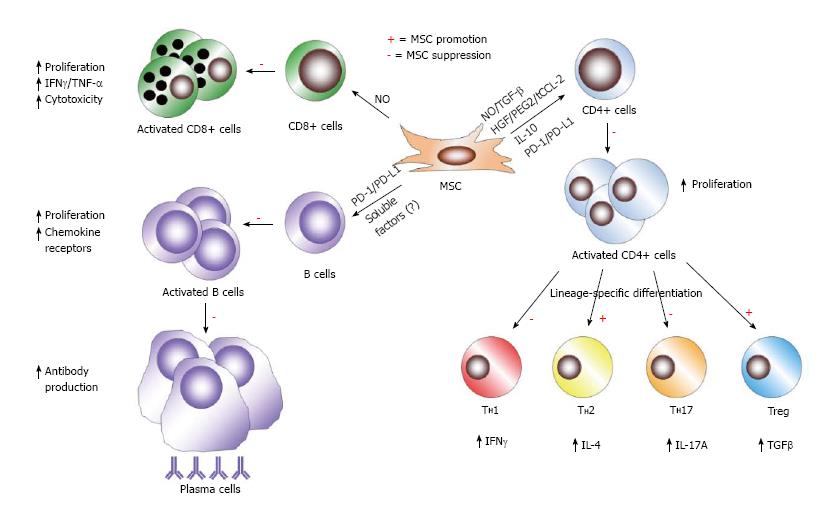Copyright
©2014 Baishideng Publishing Group Inc.
World J Stem Cells. Nov 26, 2014; 6(5): 526-539
Published online Nov 26, 2014. doi: 10.4252/wjsc.v6.i5.526
Published online Nov 26, 2014. doi: 10.4252/wjsc.v6.i5.526
Figure 4 Mesenchymal stem cell immunosuppression of adaptive immune cells.
In the context of B cells, mesenchymal stem cells (MSCs) inhibit various facets of B cells activity, including activation, proliferation, chemokine receptor expression, and differentiation to becoming antibody-secreting plasma cells. Unknown soluble factors and PD-1/PD-L1 ligation mediate these effects of MSCs on B cells. MSC have been shown to induce NO in response to inflammatory cytokine detection to suppress CD8+ T cell proliferation, cytokine production, and cytotoxicity. In response to activation in specific cytokine milieus, CD4+ T cells can differentiate into numerous effector populations. MSCs produce soluble factors (NO, TGF-B, HGF, PGE2, truncated CCL-2, and IL-10) and membrane-bound molecules (PD-1 ligation) to achieve suppression of CD4+ T cell proliferation and the polarization of CD4+ T cells towards TH1 and TH17 cells. MSCs favor the development of TH2 and anti-inflammatory Treg populations.
- Citation: Glenn JD, Whartenby KA. Mesenchymal stem cells: Emerging mechanisms of immunomodulation and therapy. World J Stem Cells 2014; 6(5): 526-539
- URL: https://www.wjgnet.com/1948-0210/full/v6/i5/526.htm
- DOI: https://dx.doi.org/10.4252/wjsc.v6.i5.526









